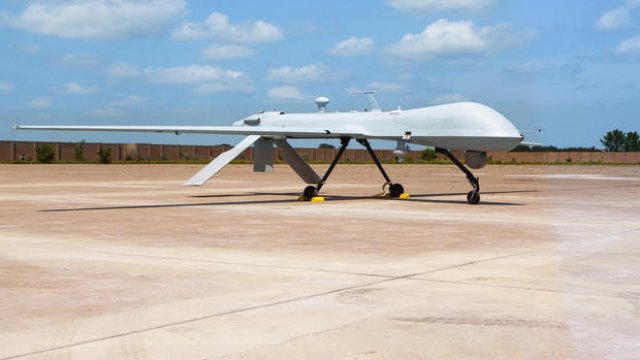 General Atomics Aeronautical Systems, Inc. has announced that the company’s new Unmanned Aircraft System (UAS) Flight Training Academy graduated its first cadre of GA-ASI aircrews on August 12th.
General Atomics Aeronautical Systems, Inc. has announced that the company’s new Unmanned Aircraft System (UAS) Flight Training Academy graduated its first cadre of GA-ASI aircrews on August 12th.
“Our first graduates have benefitted from safe, effective, cutting-edge training that will enable them to support flight operations for our global customers,” said David R. Alexander, president, Aircraft Systems, GA-ASI. “We look forward to providing the same high-quality training services to our customers’ aircrews to meet their growing demands in the very near future.”
GA-ASI’s North Dakota-based Flight Training Academy now demonstrates a dramatic reduction in the time required to train qualified aircrew, thereby expanding the company’s ability to meet the growing demand for Predator-series UAS and the aircrew required to fly them. Prior to the Academy’s opening in June, training occurred at the company’s California flight operations facilities, where long logistical pipelines stretched aircrew instruction to as long as six months. Today, students can complete their UAS training in as little as two months. Pilots complete 15 flights (36 hours), 25 simulator lessons (59 hours), and 114 hours of academic studies. Sensor operator training time is similar with the exception that slightly fewer hours are required for graduation.
Three pilots comprised the Academy’s first graduating class. Five additional pilots and six sensor operators will follow shortly. Upon graduation, the new aircrews will join GA-ASI’s approximately 230 qualified aircrews currently deployed around the world.
Prior to entering training, all GA-ASI UAS pilots must possess a Bachelor’s degree, a FAA commercial instrument pilot rating and accumulate 300 hours as a pilot-in-command. For sensor operators, a commercial pilot rating or a private pilot license is required. Both pilots and sensor operators also must be able to maintain a Class II FAA medical certificate and to obtain and maintain a DoD security clearance,
GA-ASI Flight Training Academy graduates are qualified aircrews for Predator A. The company expects to have its second training system, Predator B, available before the end of this year, providing students with the opportunity to qualify on both aircraft.
As an additional benefit, the Training Academy also can serve to augment U.S. Air Force RPA training programs.
Source: Press Release
